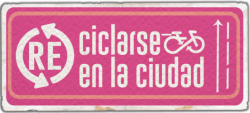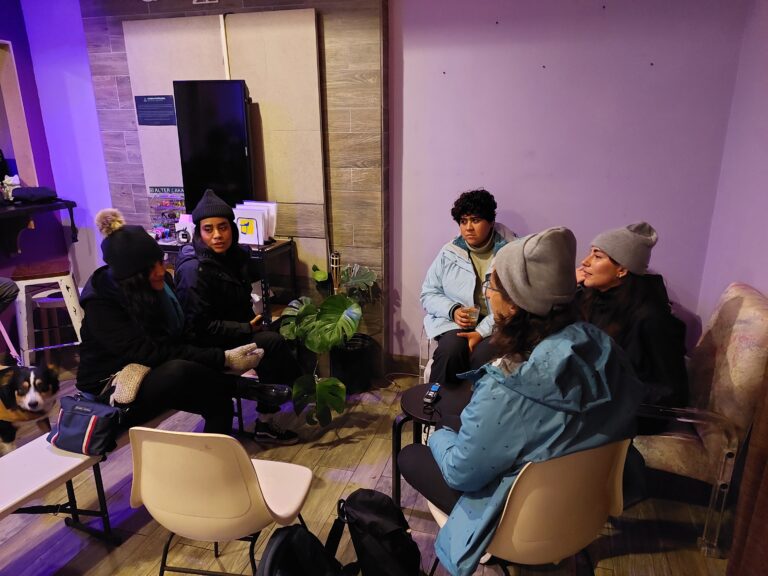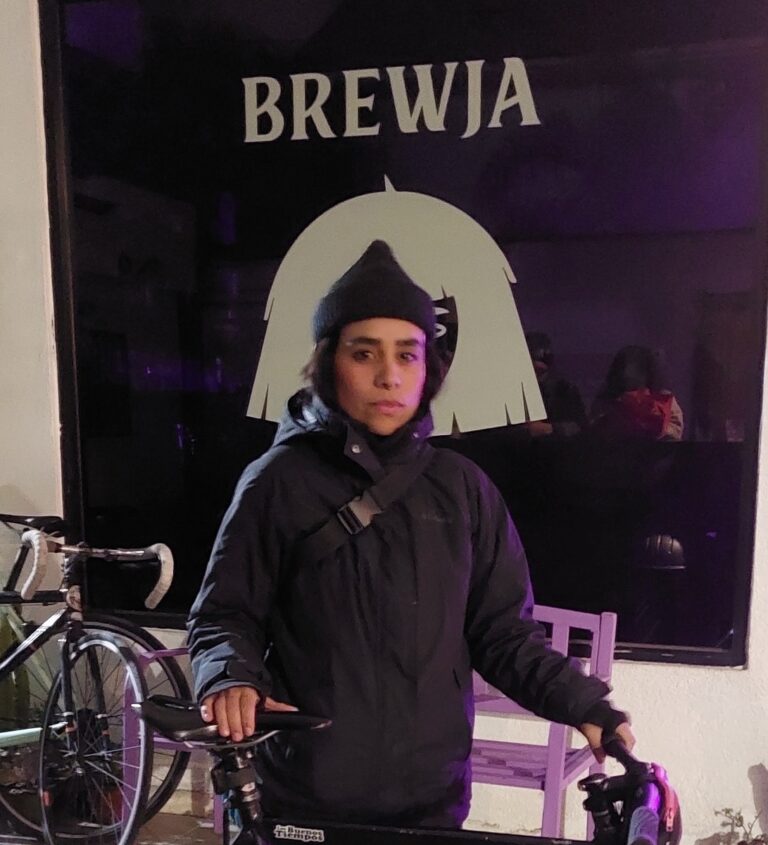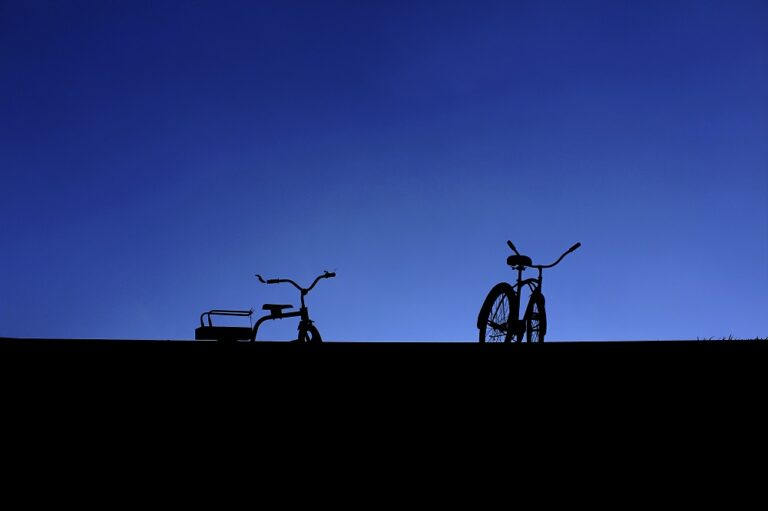
Lucy Arroyo
My Goal Was To Learn
Oaxaca, Oax. July 12, 2019. Vixi Escuela is in front of a small, paved park in the Reforma neighbourhood, between the Oaxaca beltway and the grey water canal, facing a Pemex gas station. Vixi means "sweet" in Mixtec. You'd think that all this collective does is teach the children of Oaxaca how to ride a bike. But in reality, their activities, taken as a whole, constitute a workshop about civic responsibilities in the broadest sense. The activities constitute a workshop that teaches one how to learn how to live and be among others. They place a focus on gender, the environment, sustainable mobility, and inclusivity. Bicycles are the fundamental instrument of this citizen-oriented pedagogy. First off, members apologize to society. At the entrance to the premises, behind the jumble of donated bicycles that the collective repairs for its workshops, there is a sign that reads: "Sorry for the inconvenience, we are improving the world." Under the harsh sun of a Saturday in July, we talked to several members of the group, one of which was Lucy.
I was born in a small town called Santa María Roaló - where Princess Donají went to live. It's in the municipality of Zaachila in Southern Mexico. Right now, I live in El Tule. I am an accountant and work in health care, in administration. I use a bicycle to get around. I really like living in El Tule because there's a bike path that I always take to go to work. It's about ten kilometers long.
He said that women belong in the kitchen. So, my challenge was to leave home and make it to the city with nothing, just like that, all on my own.
As a child, my biggest challenge in life was getting to the city of Oaxaca. My grandparents raised me, and my grandfather was very sexist. He said that women belong in the kitchen. So, my challenge was to leave home and make it to the city with nothing, just like that, all on my own. I made it happen at fifteen when I started secondary school. I was able to study in my town with my grandmother's support. My grandfather didn't think it was right as a lady for me to study, but my grandmother would always say to me, on the sly, "Go to school." I'm from a family of farmers. We grow corn and beans. The work is very hard, the harvest is very small, and a lot is lost, so I wanted a more professional career.
I arrived in the city, and the first thing I did was look for a bike. Since I had no way to pay my expenses, I said, "Ok, I'll get a bike," - and somebody gave me one. I had learned to ride a bike back home when I was six years old, even though my grandfather didn't want us riding a bike because "Bikes weren't for women." As a child, I would go to my uncle's mill. It had one of those baker's bikes, the big ones with the baskets. Since I couldn't reach the seat, I would put one of my feet on the frame, and that's how I learned to ride a bike. You'd put your foot in it and do this, sideways. I fell a lot, but then one time, I got it; my goal was to learn. I never had a bike, but in elementary school, I had friends who had bikes, and they would let me borrow them. My cousins lent me their bikes too. I didn't go to high school; instead, they sent me to telesecundaria (a television-based school program) in another town - and my friends there had bikes. It took around twenty minutes to walk from my town to the other town. My friends that had a little more money had bikes, and sometimes three or four of us would ride on one together. That's how we got ourselves to telesecundaria. We had to get by that way because no one ever bought us a bike.
I remember my childhood fondly. We were never bought toys, so we made our own. We would put corn-silk hair on corn husks, cover them with totomoxtle, and make dresses for them. We played with all the plants. We made our own toys. I remember using castor-oil plant leaves as parasols to protect us from the sun. We also used to play with corn and pull out the little threads of silk. And we would make figurines out of pumpkins and play with them too.
We weren't allowed to just go out and play either, so in the afternoons, we would sneak out with our friends on bikes to visit and explore other towns. My sister was always very scared; I was fearless. She would sometimes stay at home to cover for us with another sister. So, I would go with my friends... just friends, not my family. And boys too. We would meet up at street corners, and they would be waiting for us there with the bikes to take us to another little town nearby called La Guadalupe. We'd also go to La Trinidad. Some of the bikes had pegs, and that's how three or four of us could fit. One would ride on the back, the one on the seat would pedal, another one sat on the frame, and then one more on the handlebars. Sometimes there were pegs in the front, too, so the person in front would sit on the handlebars and rest their feet on them, and they'd yell, "This way! That way!" or "Watch out!" It was a 20" BMX bike, the one with thick tires.

That's why, when my grandfather said, "If you leave, don't come back," I came to Oaxaca alone, and the first thing I did was get a bike. It was especially hard because I was really young and didn't know my way around the city. In fact, just crossing these streets felt like a quest for me. I didn't know how traffic lights worked, so I would just watch how people moved around. It was also quite challenging economically. I had no way to pay for school supplies and room rent, and the move was very difficult. So, I started working for a cousin who had a newspaper. They had bikes there because the paper was delivered by bike. My cousin told me if I gave them a hand delivering newspapers, I could keep the bike. I also worked the front desk for a while, and that helped take care of rent and school supplies. My grandmother took care of my food. She'd send it to me from home, or I'd go to town to get it and smuggle it back.
When I rode my bike to school, some of my classmates would ask if I didn't have money for public transport; but others would say, “Wow!” and were amazed. “I can’t believe you're riding your bike!” they'd say. I lived on the south side of Xoxo for a while, and my school was in el Parque del Amor. They’re about five kilometers apart. People would say to me, "Hey, Lucy, aren't you afraid? You could get run over.” They were always a little negative, and sometimes some were positive, but always more were negative because they would say, “How are you going to ride a bike if you're a woman? Something could happen to you; you could get run over." I didn't pay them any mind.
I was never afraid. I always felt stronger on a bike than I did walking. And entering competitions was what forged my character because I was a very shy girl. I didn't talk. To this day, I still find it hard to express myself. I came here the same way that all the girls from small towns do: with their braids and their ribbons, with guarachitos on their feet and in their dresses. I wasn't allowed to wear pants for my grandfather's reasons. But I preferred to wear pants because they're more comfortable on the bike for when you have to get off quickly; jump; whatever... So, I bought some pants. People were already wearing pants here, but since you had to wear a uniform to school, it was a skirt for me. I wore pants, and at school, I would change into a skirt.
Back then, there were fewer cars in Oaxaca, even fewer bikes, and almost no women on bikes. But I kept on cycling and got in good shape. Then people started holding competitions - but only for men. A friend of mine, Pedro Martínez... He was the first renowned Oaxacan cyclist. He does tours now. Pedro was the first person I met riding a bike in Jalatlaco. I liked going there because the neighborhood was very nice. Then, one time, I stumbled upon the shop and went in - and there was Don Pedro. I don't know why but I started asking him about what he did for a living, what he was doing, and so on; and he told me his story. He was the one who invited me to the competitions. One day he offered to rent me a bike so that I could enter the competitions. I accepted. And the truth is, I was in very good shape, and I was the only woman. I think it was around '94. Then another girl came along. She did triathlons. In fact, there were more women doing triathlons. And this girl, well... I beat her - and she had a lot of experience in competitions. I came in second place, and I was overcome with emotion... I even cried. I liked it; I liked the feeling - of feeling my heart at its fullest. When people look at you and shout for you, you feel adrenaline; you feel joy; strength. They used to say to me, "Come on, chamaca!" "Get it girl!" I felt really good. I felt strong; empowered. But in the end, we weren't taken seriously because we were women. Two women.
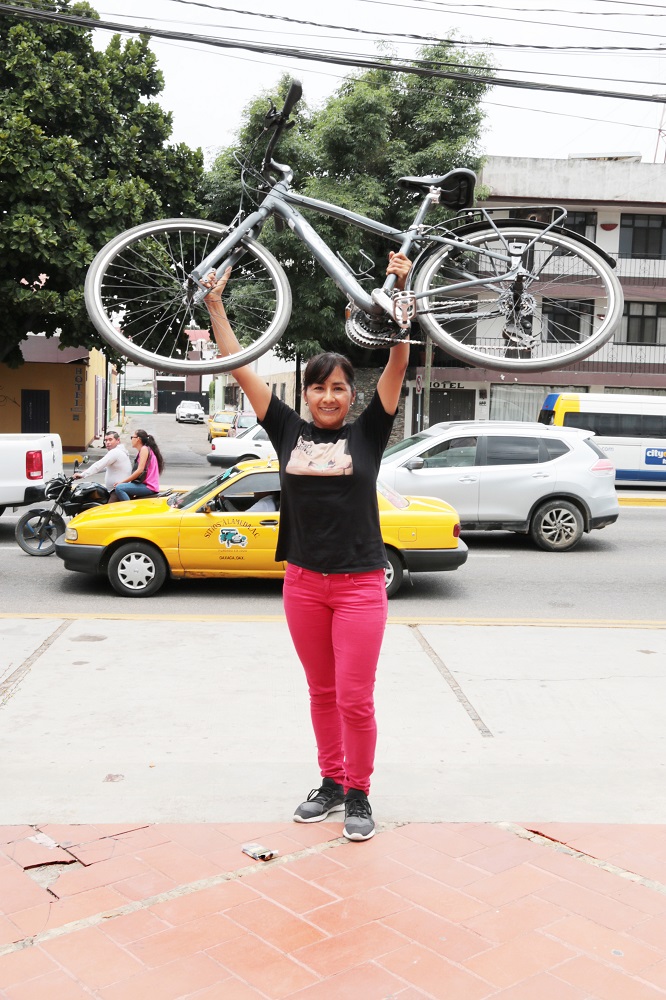
I was around seventeen years old at the time of that competition. Every time I got on the bike, everything was different. I'd forgotten about... well, about my grandfather, who always scolded me. I felt like my grandfather didn't love me. Well, I don't know - and I was my grandmother's spoiled brat, right? But I felt that my grandfather, well... I sort of felt like he hated me because of the way he treated us. Maybe he was brought up like that, too, right? I always wanted to tell my grandfather that I was a great biker. But I never could. I didn't get the chance to. I feel like I never knew him well - like I never got that close to him.
Then the men's individual competitions started. I entered them, but I didn't place well because they were so tough. I felt I was in good shape, but I would place fourth or fifth. Everything was going smoothly, and I was feeling good - very, very good. They gradually began to include a women's division because there were about five or six of us. The girls would leave, come back in, and I'd keep going. I competed for about fifteen years. I was still competing in some races up until a year ago, and I was doing well, quite well.
I also did a bunch of training courses and went on to compete at the national level. I had the support of several individuals. As expected, there was no support from the state government, but many people did support me so that I could compete abroad. My family was never able to come with me to competitions. That part was lacking - support from my family.
The bike has also given me emotional stability. When I’m sad, I get on my bike and - since I live about ten minutes away from the town of Tule - there are mountains almost right in front of my house. So, when I’m sad or angry, or when I need to like... find an answer, I grab my bike and go to the mountains. I like to climb a hill where there is a rock, and you can see a lot of the city and other mountains. There’s fresh air, and I sit there and find my answers or sort through my emotions.
It's our goal to show women that they can repair bikes too, that it's not a matter of being a woman or a man.
Now I'm here at Vixi School. What I like most is getting kids involved. I really like the workshops we give to the little kids at a museum. We offer a basic mechanics workshop for women and a skills workshop as well. We offer the mechanics workshop to men as well, but it's our goal to show women that they can repair bikes too, that it's not a matter of being a woman or a man.
Sometimes I go to town on my bike. Every time I go, I remember myself as a little girl, biking with my friends, with the crew there. Now all I have left in town are a few aunts and uncles. Aunts and uncles who took care of me when I was little. My mother died when I was, I think, two years old. My dad's there too, but... I don't feel any desire to go and see him. I grew up with my grandparents and aunts and had a very strict upbringing. But I do go back, although I don't know what I feel anymore. I feel an obligation to visit my aunts and uncles, and sometimes I get the urge and go see them when I feel that excitement. I make the most of that feeling to be with them and spend time with them. That's all.
Redes de Lucy Arroyo
Share this story
Colaboradores
Entrevista: Alejandro Zamora
Revisión: María Ávila, Hannah Wilson
Fotografía: Itzel Ávila
